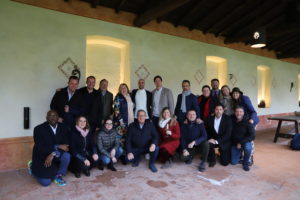Building Blocks of a Wine Company Startup
By: Charles Lazzara
A group of young entrepreneurs reached out to me for some advice with their new wine distribution business the other day. They were very excited and appeared super focused, but their organizational structure looked more like a class paper than real life. On paper they had a CEO, CSO, CFO, “Education Officer,” Advanced Somm on payroll, and someone called the “Head People Officer.” They did not have sales people to manage, no employees to file HR claims, and no customers yet.
I told the group they appeared to be all hat and no cattle. What did they know about the industry that they believed presented either a gap or a problem worth solving? How could they distribute better, or offer products that were compelling enough to compete and win in a supersaturated and flat category like wine? I thought there needed to be a business case to start the business, otherwise what was the point?
Most days I feel like I’m still in startup mode, but the business has come a long way since opening the doors in 2007. Back then, I had a really simple idea and with only $10,000 to buy wine and start delivering, the org chart was pretty boring. It was just me.

My strategy was really simple. Sell as much wine as I could by developing great relationships with 20 accounts, then recover the AR to buy more of the same wine. I didn’t hire a sales person until I had a territory built out for them to move into and cover their cost. So, needless to say, I would incubate a territory to that threshold, then hire someone to run that territory so I could go build another, all the while I was punching the orders, reordering for the warehouse needs, recovering AR, paying bills, and organizing logistics. Office personnel were the last hires because I wasn’t selling to online retailers or chains, and I didn’t understand how the office could help generate revenue.
I remember hearing something about how Thomas Keller had new team members start in the dish pit, even if they were accomplished chefs or destined to work the floor. I think his belief was that if they knew how hard the work was at every position, they’d respect it and understand how everyone contributes to the success of the business. For me, doing all the jobs was a financial necessity — I couldn’t afford to hire anyone to do it — and it was the only way I’d ever be able to train someone in the future.
I have made tons of mistakes learning my way through each position. This has helped me be empathetic when team members make mistakes, but leaves a lot less room to be sympathetic when the same errors continue to be made. That just goes back to not listening well.

I think all organizations, big or small, should encourage their teams to feel comfortable making mistakes, granted the smaller the better. People that listen and make mistakes are likely improving themselves, attempting to improve the customer experience, and are therefore a huge benefit to the organization as they push themselves.

At Volio, we created our BFAs (Be F’ing Awesome) as a team to define our company culture.
Be of Benefit (not a burden) | Be Kind (to all) | Be Honest (aka no bullshit) | Be Bulletproof (in your knowledge)
We talk about the BFAs monthly. We give out “BFAs” in meetings and via email when people live up to these values and it’s reflected in their work.
I would love to have seen these new entrepreneurs focused more on problem solving first, and structuring their business with a commitment to their solution as opposed to an impressive org chart with no clear case for how they could compete and what their goals were. Starting a business does not mean reinventing the wheel, but I wanted to be walked through the gaps in the wine business in a way that demonstrated their understanding of the industry. For example, they could implement inexpensive, widely available technology to optimize their prospective buyer’s time so that face-to-face meetings build up to a meaningful relationship as opposed to a transaction.
Startups have an amazing freedom to pivot, adapt, and change to meet a customer’s need that established companies really cannot compete with. It’s their relationship superpower. In the distribution business, so many established companies are burdened with layers of bureaucracy that customers would almost rather support anyone else if they have good reason to do so… they just want to build a relationship with someone who they see as a benefit to their business, not the other way around.
I really hope these young entrepreneurs can find a way to stand out, and I’d love to see them find their purpose and kick butt. I don’t think there is anything more exciting than seeing someone do well when they take risks.
– – – – –
If you enjoyed this post, sign up for our newsletter to receive regular educational content and updates from Volio!

